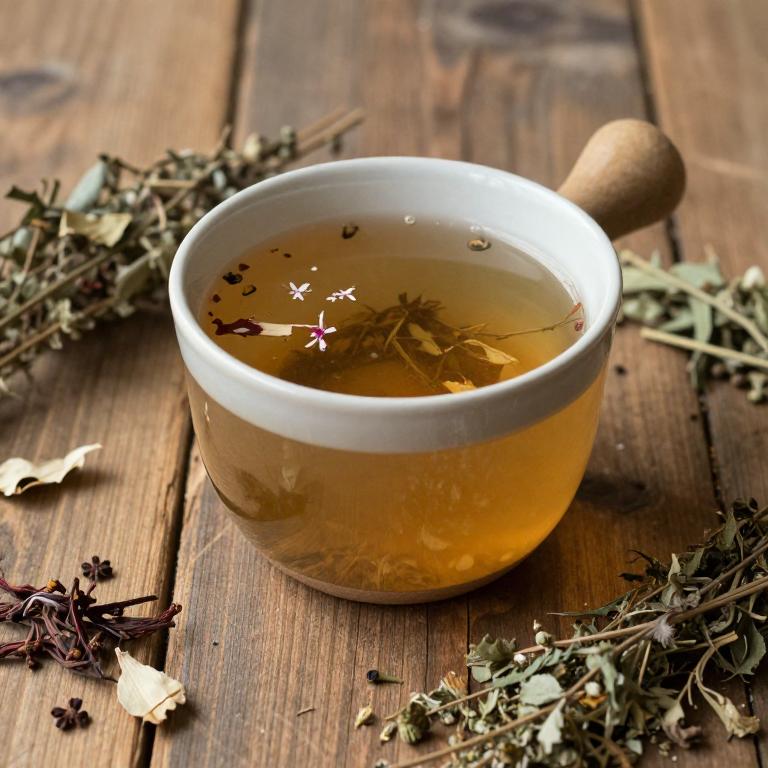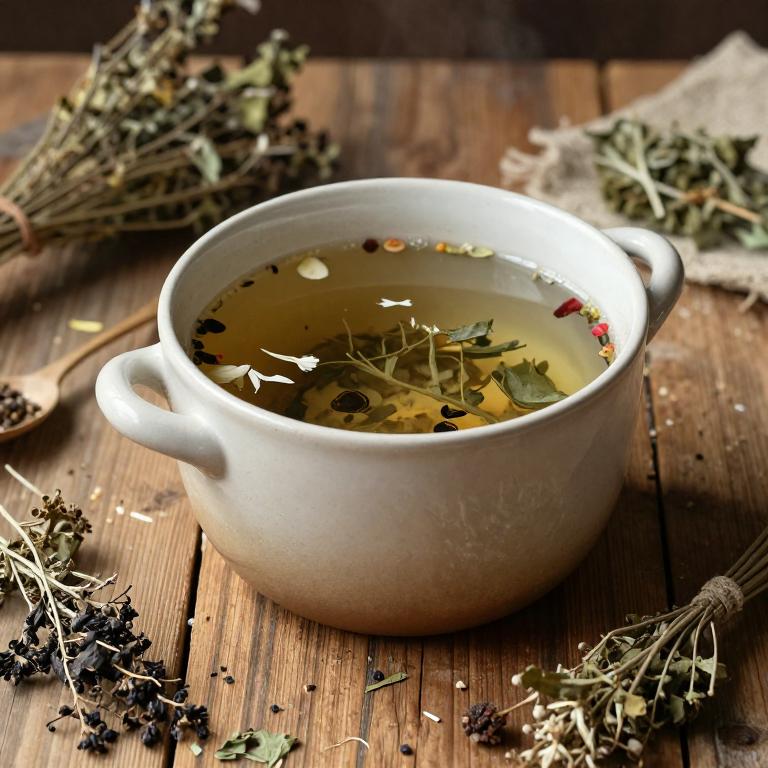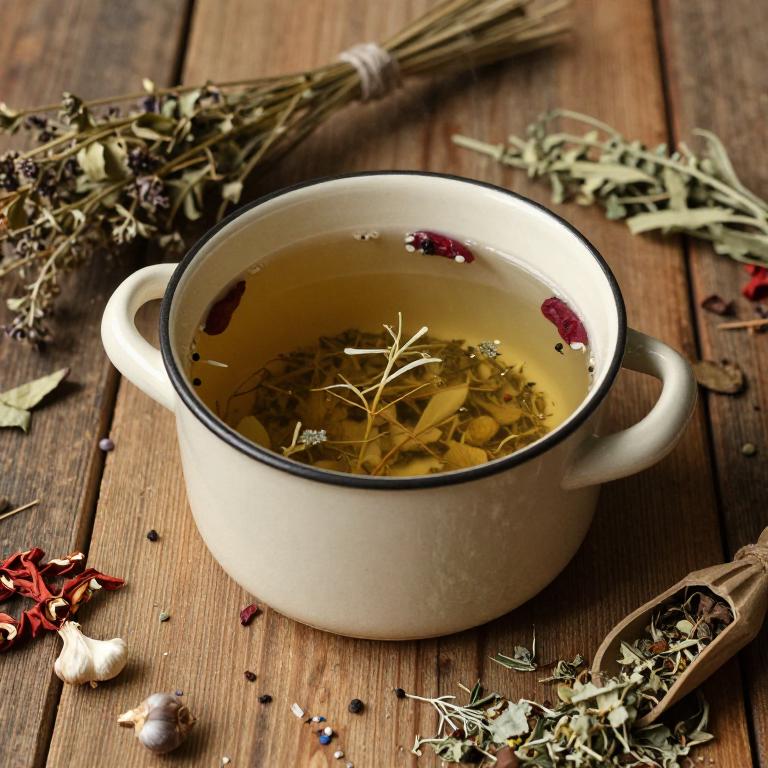10 Best Herbal Decoctions For Allergies

Herbal decoctions have been traditionally used to alleviate allergy symptoms by harnessing the anti-inflammatory and antihistaminic properties of various plants.
Common herbs such as nettle, echinacea, and ginger are often included in these decoctions due to their ability to reduce histamine release and soothe respiratory passages. To prepare a decoction, the herbs are typically simmered in water for an extended period to extract their active compounds, resulting in a potent herbal tea. While some people find relief from herbal decoctions, it is important to consult with a healthcare professional before use, especially for those with existing medical conditions or taking other medications.
These natural remedies can complement conventional allergy treatments but should not replace them without proper guidance.
Table of Contents
- 1. Stinging nettle (Urtica dioica)
- 2. St. john's wort (Hypericum perforatum)
- 3. Plantain (Plantago lanceolata)
- 4. Thyme (Thymus vulgaris)
- 5. Echinacea (Echinacea purpurea)
- 6. Salvia (Salvia officinalis)
- 7. German chamomile (Chamomilla recutita)
- 8. St. john's wort (Agrimonia eupatoria)
- 9. Chamomile (Matricaria chamomilla)
- 10. Yarrow (Achillea millefolium)
1. Stinging nettle (Urtica dioica)

Urtica dioica, commonly known as stinging nettle, has been traditionally used in herbal medicine for its potential benefits in alleviating allergy symptoms.
A decoction of stinging nettle leaves and stems can be prepared by boiling them in water for several minutes, allowing the active compounds to infuse into the liquid. This herbal remedy is believed to support the body's natural detoxification processes and may help reduce histamine levels, which are often elevated during allergic reactions. Some studies suggest that nettle may have anti-inflammatory and antihistamine properties, making it a useful complementary therapy for seasonal allergies.
However, it is important to consult with a healthcare professional before using nettle decoctions, especially for individuals with existing health conditions or those taking medications.
2. St. john's wort (Hypericum perforatum)

Hypericum perforatum, commonly known as St. John's wort, is a herbal plant often used in the form of a decoction to support immune function and alleviate allergy symptoms.
The decoction is prepared by boiling the dried herb in water, allowing the active compounds such as hypericin and hyperforin to be extracted. While not a cure for allergies, some studies suggest that St. John's wort may help reduce inflammation and histamine response, which are key factors in allergic reactions. However, it is important to note that it can interact with various medications, including antidepressants and birth control, so consultation with a healthcare provider is essential before use.
As with any herbal remedy, its effectiveness can vary, and it should be used as part of a comprehensive approach to managing allergies.
3. Plantain (Plantago lanceolata)

Plantago lanceolata, commonly known as broadleaf plantain, has been traditionally used in herbal medicine for its potential to alleviate allergy symptoms.
Herbal decoctions made from the leaves of this plant are believed to support respiratory health and reduce inflammation, which can be beneficial for individuals suffering from seasonal allergies. The active compounds in Plantago lanceolata, such as aucubin and flavonoids, may contribute to its anti-inflammatory and antihistamine properties. While preliminary studies suggest possible benefits, more research is needed to confirm its efficacy and safety for allergy treatment.
As with any herbal remedy, it is advisable to consult a healthcare professional before using Plantago lanceolata decoctions, especially for those with existing health conditions or taking other medications.
4. Thyme (Thymus vulgaris)

Thymus vulgaris, commonly known as thyme, has been traditionally used in herbal medicine for its potential benefits in alleviating allergy symptoms.
Herbal decoctions made from thyme leaves and flowers are often prepared by simmering the dried plant material in water, allowing the active compounds to be extracted. These decoctions are believed to support respiratory health and reduce inflammation, which may help ease symptoms such as sneezing, coughing, and nasal congestion. Thyme contains essential oils like thymol and carvacrol, which have antimicrobial and antihistamine properties that may contribute to its effectiveness in allergy management.
While some studies suggest thyme may offer relief for mild allergic reactions, it is advisable to consult a healthcare professional before using it as a treatment for allergies.
5. Echinacea (Echinacea purpurea)

Echinacea purpurea, commonly known as purple coneflower, is a popular herbal remedy often used to support immune function and alleviate allergy symptoms.
Herbal decoctions of Echinacea purpurea are prepared by simmering the dried roots, leaves, or flowers in water, creating a concentrated tea-like infusion. Some studies suggest that these decoctions may help reduce the severity and frequency of allergic reactions by modulating the immune response. However, the effectiveness of Echinacea in treating allergies can vary, and more research is needed to confirm its long-term benefits.
As with any herbal remedy, it is advisable to consult a healthcare professional before use, especially for individuals with known allergies or taking other medications.
6. Salvia (Salvia officinalis)

Salvia officinalis, commonly known as sage, has been traditionally used in herbal medicine for its potential benefits in alleviating allergy symptoms.
Herbal decoctions made from sage leaves are often prepared by simmering the dried leaves in water to extract their active compounds, such as flavonoids and phenolic acids. These compounds are believed to possess anti-inflammatory and antihistamine properties that may help reduce nasal congestion and allergic reactions. While some studies suggest that sage may support immune function and reduce histamine levels, more clinical research is needed to confirm its efficacy for allergies.
As with any herbal remedy, it is important to consult a healthcare professional before using sage decoctions, especially for individuals with existing health conditions or those taking medications.
7. German chamomile (Chamomilla recutita)

Chamomilla recutita, commonly known as German chamomile, has been traditionally used for its calming and anti-inflammatory properties.
Herbal decoctions made from its flowers are often prepared by steeping the dried blossoms in hot water, creating a soothing infusion that can be consumed as a tea. These decoctions are believed to help alleviate symptoms of allergies due to their ability to reduce histamine release and soothe respiratory irritation. Some studies suggest that chamomile may possess antihistamine-like effects, making it a potential natural remedy for mild allergic reactions.
However, it is important to consult with a healthcare provider before using chamomile decoctions, especially for individuals with known allergies or chronic conditions.
8. St. john's wort (Agrimonia eupatoria)

Agrimonia eupatoria, commonly known as St. John's wort, is a traditional herb used in herbal medicine for its potential anti-inflammatory and antihistamine properties.
Herbal decoctions made from Agrimonia eupatoria are often prepared by simmering the dried plant material in water to extract its active compounds. These decoctions may help alleviate allergy symptoms by reducing histamine release and soothing respiratory irritation. Some studies suggest that the herb's flavonoids and tannins contribute to its therapeutic effects.
However, it is important to consult a healthcare professional before using Agrimonia eupatoria, as it may interact with certain medications.
9. Chamomile (Matricaria chamomilla)

Matricaria chamomilla, commonly known as German chamomile, is widely used in herbal decoctions to alleviate allergy symptoms due to its anti-inflammatory and antihistamine properties.
When prepared as a tea, chamomile decoctions can help reduce nasal congestion, sneezing, and skin irritation associated with allergic reactions. The active compounds, such as flavonoids and bisabolol, contribute to its soothing and immune-modulating effects. Regular consumption of chamomile tea may support the body's natural response to allergens and reduce the frequency of allergic episodes.
However, it is important to consult a healthcare professional before using chamomile, especially for individuals with known allergies or taking other medications.
10. Yarrow (Achillea millefolium)

Achillea millefolium, commonly known as yarrow, has been traditionally used in herbal medicine for its potential benefits in alleviating allergy symptoms.
Herbal decoctions made from the dried leaves and flowers of yarrow are believed to have anti-inflammatory and antihistamine properties that may help reduce allergic reactions. These decoctions are typically prepared by simmering the plant material in water for several minutes, then allowing it to steep before consumption. Some studies suggest that compounds in yarrow, such as achillene and flavonoids, may support immune system function and reduce histamine release.
While yarrow may offer supportive relief for allergy symptoms, it is important to consult a healthcare professional before using it as a treatment, especially for severe or chronic allergies.